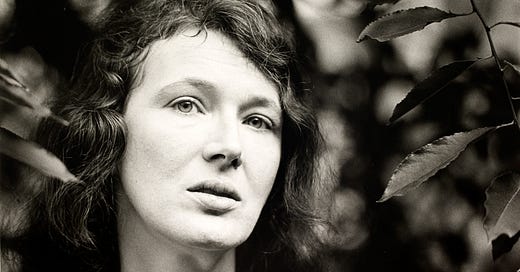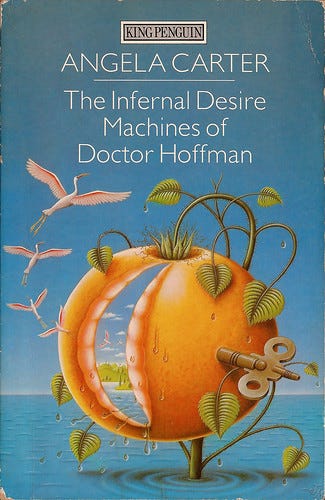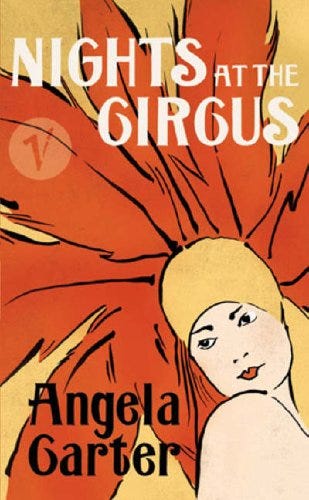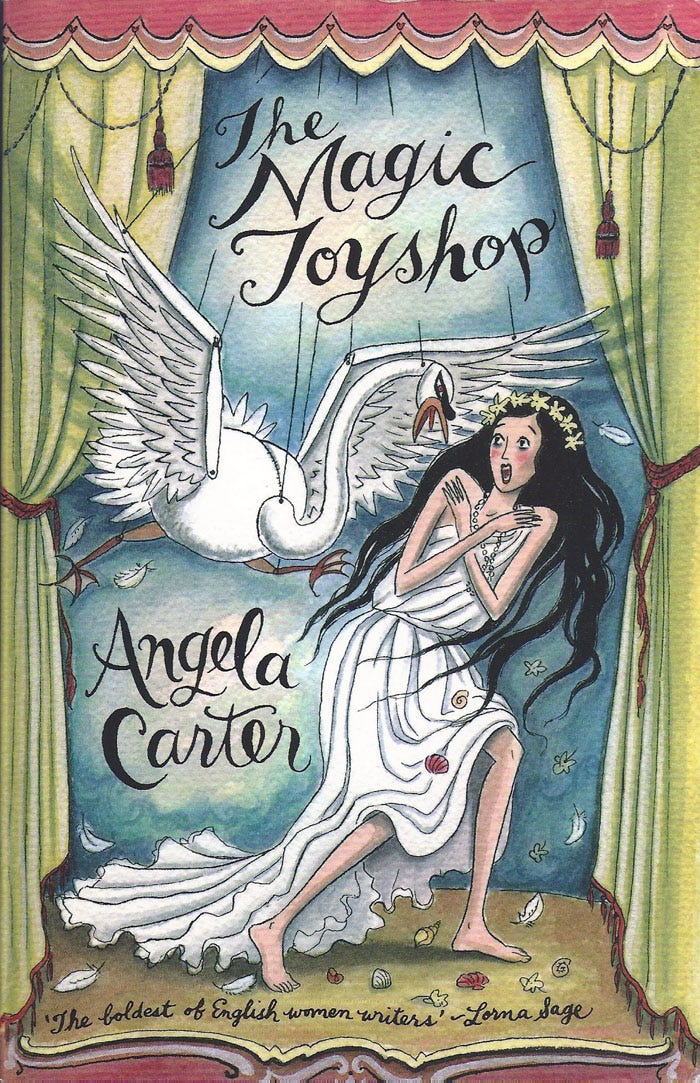Angela Carter was a writer, feminist, and a critical voice in contemporary literature. Born in 1940 and passing away in 1992, Carter's literary career spanned several decades, during which she produced a diverse body of work, including novels, short stories, and essays. Her writing style was characterized by a fusion of Gothic, fantastical, and surreal elements, challenging traditional literary conventions and questioning societal norms. In her exploration of loneliness, Carter delved into the darker aspects of human nature, inviting readers to confront their own fears, desires, and sense of isolation.
One of Carter's most celebrated novels, The Magic Toyshop (1967), delves into the theme of loneliness, particularly concerning the character of Melanie, a teenage girl who finds herself orphaned and sent to live with her reclusive uncle and his family. Melanie's journey unfolds in an eerie, desolate mansion filled with unsettling secrets and a pervasive atmosphere of isolation. Through Melanie's experiences, Carter presents the reader with an allegorical representation of the universal struggle with loneliness, amplified by the tumultuous teenage years.
Another work by Carter that explores loneliness is Nights at the Circus (1984). In this novel, she introduces Fevvers, a larger-than-life circus performer with wings. Despite her extraordinary appearance, Fevvers grapples with profound loneliness and an underlying sense of detachment from the world around her. Through this character, Carter highlights how even those who stand out in society can experience a profound sense of isolation, as their uniqueness sets them apart from others and hinders their ability to form meaningful connections.
Angela Carter's short stories are also rife with themes of loneliness. In "The Lady of the House of Love," from her collection The Bloody Chamber (1979), she reimagines the classic vampire narrative, exploring the lonely existence of the vampire Countess, who is cursed to a life of eternal solitude and despair. Carter skillfully weaves gothic elements with psychological depth, illuminating the connection between immortality and emotional isolation.
Carter's examination of loneliness goes beyond the individual level. In The Infernal Desire Machines of Doctor Hoffman (1972), she crafts a surreal, dreamlike world, where the protagonist, Desiderio, embarks on a quest to combat the machinations of a malevolent scientist. In this novel, loneliness is depicted as a collective experience, affecting an entire society trapped in a state of disconnection and apathy.
Furthermore, Angela Carter's exploration of gender and sexuality in her works intersects with her portrayal of loneliness. As a feminist writer, she critiqued patriarchal power structures that perpetuate isolation and marginalization, particularly for women. In works, she analyzes the historical repression of women's desires and agency, uncovering how societal norms contribute to female loneliness and disempowerment.
Carter's writing style and narrative techniques contribute to the immersive experience of loneliness in her works. Her lush prose, vivid imagery, and fantastical settings create an emotional intensity that resonates with readers, enabling them to empathize with the characters' struggles and emotional isolation. Her use of magical realism and Gothic elements adds an otherworldly quality, underscoring the isolating aspects of the human condition and the mysteries of the human psyche.
Angela Carter's work can be seen as a reflection of her own life experiences and struggles with loneliness. Born during World War II and raised in a tumultuous post-war era, she navigated a changing world that often emphasized conformity over individuality. Carter's own sense of alienation as a writer who defied conventional norms likely informed her portrayal of characters grappling with isolation and societal constraints.
Angela Carter's literary legacy is marked by her unflinching exploration of loneliness and its intricate manifestations in the human experience. Through her innovative storytelling, she invites readers to confront their own feelings of isolation and to question the societal forces that contribute to loneliness. Carter's ability to blend surrealism, gothic themes, and feminist perspectives enriches her narratives, making her works a captivating and thought-provoking exploration of the human condition. As readers engage with her stories, they are prompted to reflect on their own connections with others, the barriers that keep them apart, and the profound impact of loneliness on individuals and society at large.
Angela Carter was a British writer born on May 7, 1940, in Eastbourne, Sussex, England. She grew up in a working-class family, and her formative years were shaped by the aftermath of World War II. Despite a somewhat challenging upbringing, Carter displayed a love for literature and storytelling from a young age, foreshadowing her future as a prolific and influential writer.
Carter attended the University of Bristol, where she studied English literature. Her university years proved to be a period of intellectual growth, exposing her to various literary traditions and fueling her interest in feminism and politics. During this time, she also began experimenting with her writing, exploring different styles and themes that would later become hallmarks of her literary career.
In 1960, Angela Carter married Paul Carter, and the couple had a son together before eventually divorcing. She then embarked on a journey of self-discovery, travel, and further education. In Japan, she taught English and immersed herself in the country's rich cultural heritage. This experience broadened her perspectives and enriched her storytelling with elements of Eastern mythology and folklore.
Carter's literary debut came with the publication of her first novel, "Shadow Dance," in 1966. However, it was her second novel, The Magic Toyshop, published in 1967, that garnered widespread critical acclaim and established her reputation as a talented and innovative writer. The novel showcased her ability to blend Gothic elements with a feminist perspective, a distinctive style that would come to define much of her work.
Throughout her career, Angela Carter produced a diverse body of work, including novels, short stories, essays, and radio plays. Her writing explored themes of gender, sexuality, identity, and the human condition, often challenging societal norms and conventions. She was an outspoken advocate for feminism and consistently used her literary voice to critique patriarchal power structures and advocate for female empowerment.
In 1979, Carter's collection of short stories, The Bloody Chamber, further solidified her literary reputation. The collection offered dark and sensual retellings of classic fairy tales, infused with a feminist twist. These stories showcased her skill in weaving magical realism and gothic elements into her narratives, captivating readers and critics alike.
In addition to her fiction, Angela Carter wrote several thought-provoking essays, including The Sadeian Woman: An Exercise in Cultural History (1979), which explored the history of women's sexual oppression through a lens of the Marquis de Sade's works. Her non-fiction writings were just as impactful as her imaginative fiction, contributing to the broader feminist discourse.
Tragically, Angela Carter's life was cut short when she passed away on February 16, 1992, at the age of 51, due to lung cancer. Her untimely death marked the end of a brilliant literary career, leaving a lasting impact on the literary world and inspiring future generations of writers.
Today, Angela Carter is remembered as a trailblazing literary visionary who fearlessly pushed the boundaries of conventional storytelling. Her works continue to be celebrated for their unique blend of fantasy, feminism, and social critique. By fearlessly confronting complex themes and delving into the depths of the human psyche, Angela Carter remains an enduring and influential figure in contemporary literature, leaving behind a legacy that continues to resonate with readers worldwide.
Angela Carter was a literary trailblazer known for her imaginative storytelling, feminist perspectives, and darkly enchanting narratives. Below are reviews of three of her most celebrated works, each showcasing her distinctive style and thought-provoking themes.
The Bloody Chamber is a spellbinding collection of reimagined fairy tales, where Angela Carter crafts dark and sensual retellings of classic stories. With a feminist lens, she transforms these familiar tales into provocative explorations of power dynamics, gender roles, and female agency. Carter's lush prose and evocative imagery create a mesmerizing atmosphere, immersing readers in a world of magical realism and gothic sensibilities.
In this collection, Carter examines the complexities of sexuality, desire, and the constraints imposed on women by patriarchal societies. Each story is a masterpiece of literary craftsmanship, with standouts like "The Company of Wolves," a chilling rendition of Little Red Riding Hood that delves into themes of temptation and the beast within. "The Bloody Chamber," the eponymous story, presents a haunting reimagining of Bluebeard, where the heroine must confront her fears and break free from her oppressive husband.
The Bloody Chamber is a captivating and thought-provoking collection that showcases Angela Carter's unique ability to challenge conventional fairy tales, revealing the darker aspects of human nature and society's treatment of women.
Nights at the Circus is a tour de force of magical realism and feminist storytelling. Set in the late 19th century, the novel follows the enigmatic aerialiste, Fevvers, a winged circus performer. Carter skillfully weaves together elements of circus life, historical fiction, and surrealism to create a story that defies categorization.
At its core, Nights at the Circus is a captivating exploration of identity, freedom, and the search for belonging. Fevvers' wings become a symbol of her uniqueness and the challenges she faces in forming authentic connections with others. The novel delves into the themes of illusion and reality, raising questions about the nature of truth and the subjective nature of human experience.
Carter's portrayal of Fevvers is complex and multi-dimensional, challenging stereotypes and societal expectations. As the protagonist embarks on a transformative journey, readers are taken on a rollercoaster ride of emotions, from laughter to heartache.
Nights at the Circus showcases Angela Carter's ability to blend the fantastical with the deeply human, resulting in a profound and evocative reading experience.
The Magic Toyshop is a haunting and atmospheric novel that weaves together themes of adolescence, family secrets, and the awakening of sexuality. The story centers around Melanie, a young girl who, after her parents' death, is sent to live with her mysterious uncle and his reclusive family in a desolate mansion.
Carter's portrayal of Melanie's journey into womanhood is both mesmerizing and unsettling. The novel delves into the psychological complexities of coming-of-age, exploring the tension between innocence and experience. Through Melanie's eyes, readers witness a world filled with enigmatic characters, hidden desires, and dark secrets.
The Magic Toyshop is a powerful examination of the female psyche, addressing themes of autonomy and the stifling influence of societal expectations. Carter's prose weaves a spellbinding tale, capturing the reader's imagination from the first page to the last.
Angela Carter's books offer a treasure trove of literary gems that challenge norms, provoke thought, and push the boundaries of storytelling. Her unique blend of magical realism, gothic elements, and feminist perspectives create an unparalleled reading experience that continues to captivate readers across generations. Whether exploring dark fairy tales, circus life, or the complexities of adolescence, Carter's works remain timeless and relevant, leaving an indelible mark on the world of literature.
Hi, thank you so much for reading. Sorry it may not be up to my usual standards, having to work on my phone to write as my laptop is dead!! Fancy buying me a coffee? That would be so awesome if you could and would help my work towards a new laptop.











Random note, but I have started listening to The Magic Toyshop on audio via borrowbox, as I had it reserved. Fiona Shaw, an Irish actress and director who narrates it, really helps me to process Angela's writing by conjuring up vivid images in my mind. It is a joy to listen to, so thank you for the recommendation.